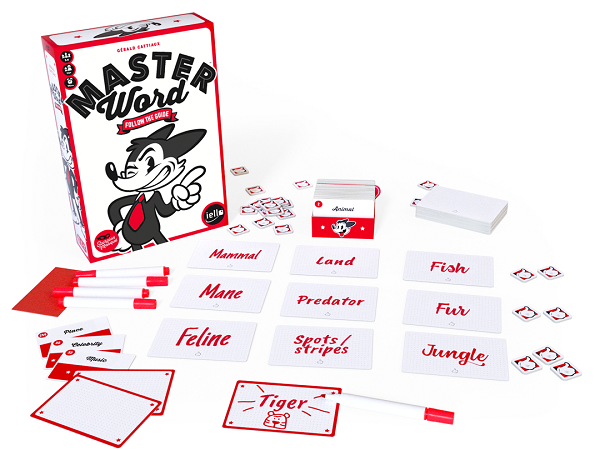Can Your Team Deduce The Master Word?

The guide knows the word and the seekers must find it. But the seekers are the ones coming up with the clues, while the guide can only tell them if their clues fit — but not which ones.
Published by Le Scorpion Masqué, Master Word is a cooperative party game in the tradition of Codenames and Cross Clues. So how does it play and what sets it apart?
Gameplay
One player is the guide and the others are the seekers. The guide draws an answer card. The bottom of the card shows the master word. This is the word the seekers are trying to guess. The top of the card shows the starting clue that the guide will give the players to start with. For example, if the master word is elephant, the clue might be animal.
The game takes place over a series of rounds (but no more than seven). Each round a ninety-second timer is started and each seeker must write a clue down on one of their clue tiles and place them in a line in the center of the table, below the tiles from the previous rounds. The clues you write down do not have to be a single word but must encompass a single idea such as ‘weighs more than 100 lbs’ or ‘is older than one hundred years’. The seekers are encouraged, and should, talk about what clues they should each write. If the master word is ever written on one of the clue tiles, however, the guide immediately stops the game and everyone loses.
Once the timer has run out and everyone has placed their clue tiles on the table, the guide may ask clarifying questions to determine the intent of the seekers. For example, if the clue is ‘it is heavy’ the guide can ask what weight the seekers feel would count as heavy. Then the guide places tokens next to the new line of clues, one token for each clue he feels is a ‘good clue’ for the master word. However, he cannot tell the seekers which clues the tokens correspond with. So if there are three clues but only two tokens, the seekers must guess which ones they believe are accurate, or figure it out based on clues from the previous round. Only once per game, the guide may place a token directly on the card it is indicating. When using this ability, the guide can choose to use it on a clue from a previous round.
The seekers have three solution tiles. Instead of writing a clue, a seeker can write what they believe to be the master word on one of these tiles and place it with the rest of the clues that round. If it is correct, all players win the game. If it wrong, it is treated as a normal clue tile when the guide places tokens.
If the seekers fail to deduce the master word on one of the solution tiles before seven rounds have finished, or they use up all their solution tiles, everyone loses the game.

Review
Master Word fits nicely in the popular clue-giving party game genre but does bring its own ideas to the gameplay. The fact that the players who don’t know the master word are the ones coming up with the clues is an interesting twist — this leads to a fun little puzzle as they try to figure out clues that will help them to narrow down the solution or deduce which clues the tokens are meant to indicate.
Gameplay is fast, which is important. The guide doesn’t have too much to do, although it is fun to listen to the seekers’ discussions. Also, tokens do not necessarily have to be used for clues that are factually correct, so much as what clues the guide believes will help lead his teammates to the correct answer, which allows the guide some creativity.
Fully cooperative mechanics always fit quite nicely in a party game, and this remains the case here. The fact that discussion is encouraged adds extra player interaction. Master Word, however, works much better with a smaller group. For one thing, at a full count of six players, there are only enough clue tiles for six rounds, which is not addressed in the rulebook. Also, since there is so much discussion about what clues should be written down, it is easier for everyone to feel involved and heard in a smaller group.
There are three hundred master word cards included with the game, and in a particularly nice touch, they are specially designed to be increasingly difficult as you play through them. In general, the game is nicely designed with solid components, and the artwork has quite a unique retro cartoon aesthetic. Though we did wish that the game came with a timer, since one is required for gameplay.
If you enjoy this genre of party game, Master Word is a solid and fun addition to it. It doesn’t bring anything hugely new to the table, but it still feels fresh enough to set itself apart from similar games and worth playing in its own right.
Pros: increasingly difficult words, interesting mechanism of seekers coming up with clues to a word they don’t know, fast gameplay
Cons: No timer included, better with a smaller group, some players may find the guide role a little slow
Disclosure: we received a complimentary review copy of this game.







